Collins to drive DFL-CN team to Professional-Continental in 2007
Buoyed by the success in Europe this year of the peloton's only joint British-Australian team in...
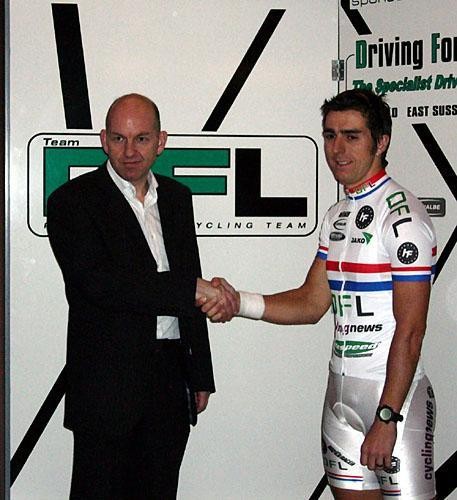
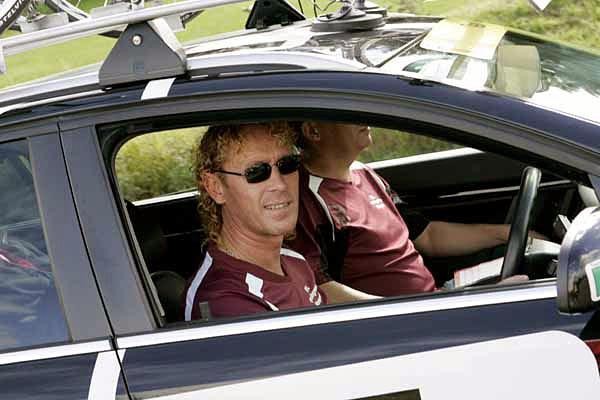
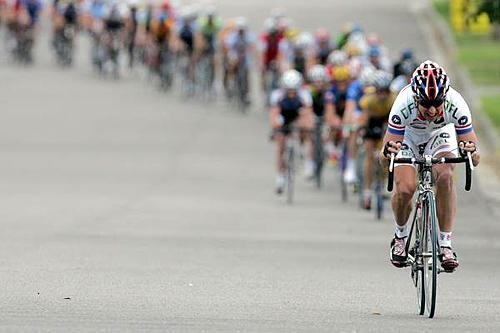
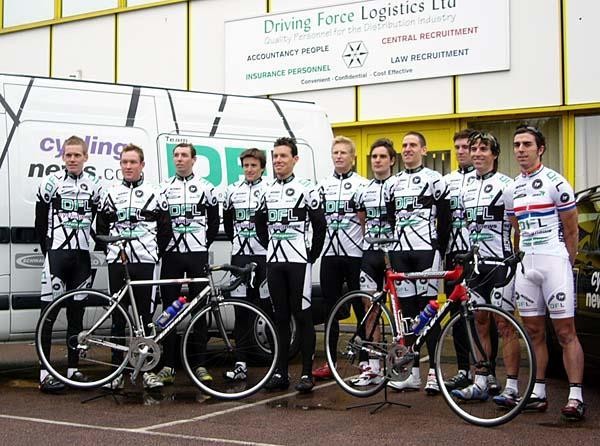
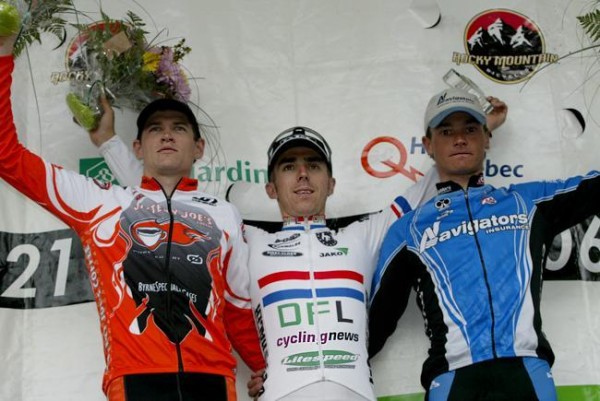
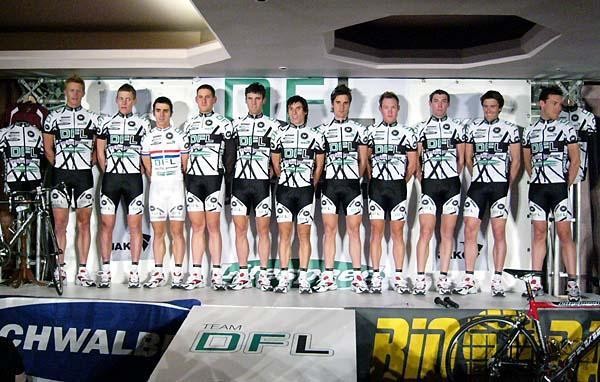




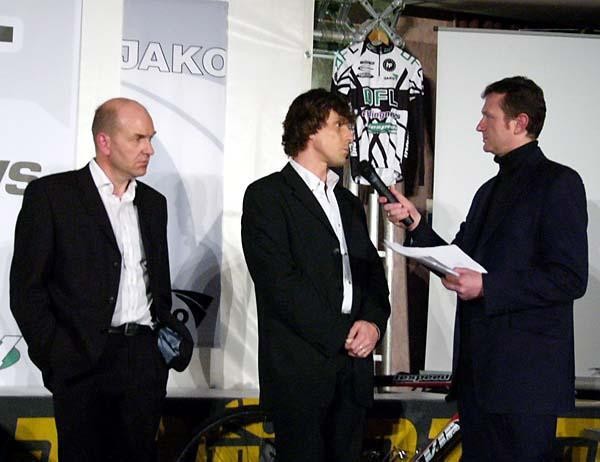


News feature, September 27, 2006.
With road cycling's negative headlines in recent months, it takes a brave businessman to commit to increase sponsorship in 2007, but the manager of DFL-Cyclingnews is not holding back. Gerard Knapp reports.
Buoyed by the success in Europe this year of the peloton's only joint British-Australian team in 2006, the driving force behind the DFL-Cyclingnews squad in 2006 has recently taken the first step towards promoting the team to the next level of the professional ranks.
Currently registered as a Continental squad in Europe (the former Division 3 ranking in pre-ProTour days), the next level up emerging pro squads is to register as a Professional Continental squad (formerly Division 2), that tier of ambitious teams that snip at the heels of the current 20 teams who make up the ProTour.
Nick Collins, the managing director of DFL, the England-based transportation services firm that is the lead sponsor of the team, said recently, "'I can confirm that we have paid for and registered as a Pro Continental Team for 2007.
"This marks continual growth from the launch in 2005 and is on target with the business plan and goals set by myself. The recruitment of Eric Vanderaerden as directeur sportif demonstrates the ambition of the team, and for the first time (the team) will feature British and Australian riders competing together as never before in Europe."
Vanderaerden, a former winner of the Tour Flanders and Paris-Roubaix, is a cycling legend in Belgium and his recent appointment inspired the team to lift again, where it recorded a strong performance in the recent Tour of Britain. DFL-Cyclingnews' rider Russell Downing was the highest-placed British rider in the country's national Tour, was just pipped by a ProTour team rider for the overall points jersey, and the team finished in fourth on the team rankings, well above several teams that boast a higher UCI ranking and funding level. In fact, there was a DFL-Cyclingnews rider on the podium for four of the six stages of the Tour.
Get The Leadout Newsletter
The latest race content, interviews, features, reviews and expert buying guides, direct to your inbox!
The team's new directeur sportif takes over from another well-credentialed Belgian cyclist, Daniel Willems, a contemporary of Eddie Merckx who won several stages of the Tour de France. Vanderaerden has joined the experienced duo of Gilbert de Weerdt and Rudi Dubois in managing the team from its humble beginnings into one of the more well-known and professionally-run Continental teams.
To adopt a sporting cliché, the team has been punching above its weight all season and has recorded numerous victories, especially to brothers Russell and Dean Downing, while one of the Australian riders, Cameron Jennings, has been become a serious contender for the general classification in the stage races the team's entered.
It is this commitment from the riders and some very strong sponsor feedback during the Tour of Britain that convinced Collins to take the next step.
Collins had several of his company's clients as guests at the Tour of Britain, and for most it was the first time in a team car, seeing a bike race up close. As is usually the case, the sponsors came away wide-eyed and in awe of the skill and speed, as well as the hospitality.
But away from the controlled environment of a national Tour in Britain, the sport can seemingly fall once again into self-destruct mode with the leaking of an alleged positive dope test from the sport's highest-profile race, and the subsequent mismanagement of the issue by the sport's senior executive.
Despite these adverse headlines, Collins remains firm in his belief that professional road cycling is undervalued as a form of sports sponsorship.
"Really, it's quite cheap compared to TV advertising, particularly across the same number of channels and markets that show these road races, and it's also very cost-effective compared to sponsoring other sports teams, like football. Speaking for my own company, this is a good vehicle for us."
However, making the jump to Pro-Conti (Professional-Continental) will require an increase in sponsorship funds, and Collins said he was quite prepared to make the necessary changes to accommodate a new sponsor. He is looking to attract an additional 500-700K euros for next season, and is very confident of securing it.
He has been in talks with a variety of potential new sponsors and while he was unable to make any announcements, he had meetings scheduled in Salzburg during the 2006 Road World Championships.
"Ideally, the best thing we could do is find a (new) sponsor from Australia or from Britain. But I also realize that cycling, as a form of sports sponsorship, is still not that well understood, or appreciated, as it is in other European countries."
While Collins would not exclude any sponsor, one aspect he will not accept is to entertain any kind of doping. "I'd rather win no races than resort to that," he said.
He is scathing of the practices that have blighted the sport for decades and as a relative newcomer to the professional cycling, especially as a sponsor, Collins said he is aghast at the retro-Euro attitude that doping is almost part of the sport's unwritten 'culture'.
"We need a new breed of management to come into cycling," he said. "I believe it is the teams who need to be just as responsible as the riders (for doping infringements).
"The team (management) should be penalized as much as the riders; you can't just keep ripping into the riders every time (they are suspended or fined for doping), when they probably have this pressure on them and yet those people (responsible for applying pressure) are always let off or not even questioned."
Pleasing sponsors
It's often said that commercial pressure to win races at-all-costs is behind most doping regimes. The athletes succumb to this pressure from sponsors or management, while equally, other riders act selfishly and alone, and then drag their teams in to the headlines when caught.
But to Collins, "there are things you can do to please sponsors other than win races", he said. Corporate hospitality activities and making the team get involved in community activities are often-overlooked ways that a team can give something back to their sponsors, he said.
Also, with the increasing popularity of cycling in English-speaking countries, Collins believes a joint British-Australian team should be attractive to not only potential sponsors, but also the International Cycling Union (UCI), the sport's ruling body.
"I believe the UCI would want a high-profile British and Australian team to emerge in the sport, especially with all its aims of promoting the sport and ProTour into those countries," he said.
While Collins isn't expecting any favours from the UCI, he can see that the team could become an attractive proposition for the organizers and sponsors of the semi-Classics, those one-day races that feature many of the ProTour teams and rank highly among riders and fans alike.
"As a Pro Continental team, we will be able to do all the races we want, and with Eric (Vanderaerden) on board we may even get into some of the semi-Classics," he said.
The next big hit-out for the squad will be at the Jayco Herald-Sun Tour, an eight-day stage race in Victoria, Australia, to be held from October 8-14. It is the team's one-and-only appearance down-under. Ironically, despite being the most highly-ranked and team with strong Australian roots and connections, its current status as a Continental squad means it is unable to secure a start in the Tour Down Under.
Collins is aiming to change that scenario as quickly as possible. "The structure of the management team is now in place and a meeting will be held this week to select the riders for 2007," he said. "Having a British or Australian passport is not a prerequisite to join the team, as all riders will be selected on merit."
Collins said he will continue to run the team on a business footing. "I am determined to be part of the change that has to take place in cycling for the sport to survive and grow. Recent bad press has not been unfair but has given everyone involved in cycling an opportunity to put their house in order and start giving value for money to sponsors, fans and television audiences.
"As an emerging team we want to be at the forefront of the changes that are needed and by bringing other life experiences to cycling we hope to enrich what is a fantastic sport and spectacle.
"I am aware that there are wider benefits of running pro teams other than winning races and as a British-Australian Team we need to help change a culture and negative view of cycling and bring about a change in peoples health and lifestyles."
(Note - This web site is a sponsor of DFL-Cyclingnews and proud to be involved with a developing team that has put in an excellent season.)